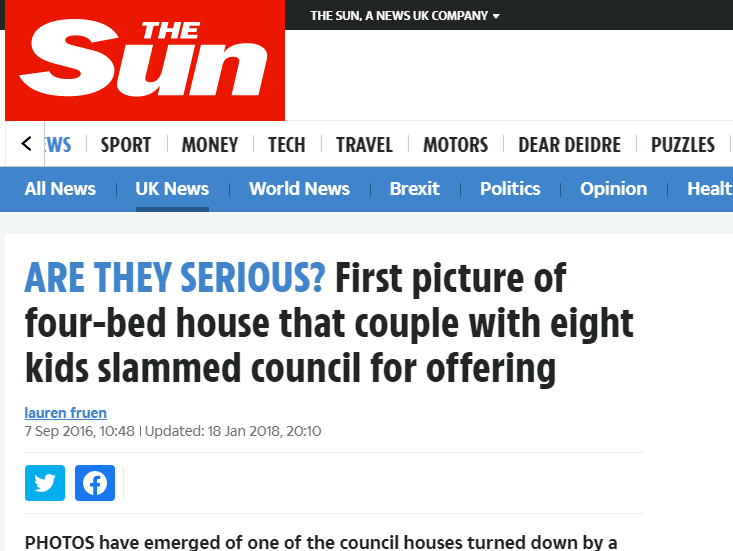
A family of ten who sought publicity through their local newspaper in their bid for a bigger council house have lost a High Court harassment case against three national titles that picked up the story.
Arnold and Jeanne Sube sued Express Newspapers, publisher of the Express and Star titles, and News Group Newspapers, publisher of the Sun, over a series of articles in 2016 and related reader comments.
The married couple, who are originally from Cameroon and moved to France then the UK, claimed coverage breached the Protection from Harassment Act.
The Sun published seven articles on the family, including: “Are they serious? First picture of four-bed house that jobless couple with eight kids slammed council for offering.”
The Daily Star ran five articles, including: “Jobless dad whines about £15k a year council home – and turns down five-bedroom house.”
While the Daily Express ran seven articles, including: “Shameless French family-of-10 demand MANSION: Benefits dad rejects 5-bed as ‘too cramped'”
The story first ran in free local newspaper the MK Citizen in Milton Keynes in September 2016 after Mr Sube rang the newsdesk complaining that his family needed a bigger home and posed for photos.
Sube tried to get some elements of the article corrected the day after publication, but the reporter responded that she and her editor “did not see that any changes needed to be made”, court documents show.
On the same morning, Mr Sube was contacted by journalists from news agencies Caters and SWNS. The first Sun article was published before 11am the same day.
Mr Sube told the court he “felt helpless, upset and felt like I had been betrayed by the MK Citizen” and that he was “shocked” by the reaction of the public in the news websites’ comments sections and on social media – including death threats and racist abuse.
More articles were published some six weeks later after the Subes moved to a new council house, where they were visited by a number of journalists.
Mr Sube complained of journalists hiding and of intimidation by a photographer coming out of some bushes to take pictures of his wife, the court was told.
He added that the articles had led people to “believe things about us which were not true” and that it had a “serious impact” on his mental health.
At a hearing in February, Mark Engelman, for the family, said the articles and “voluminous” reader posts constituted a “course of conduct” amounting to harassment, and that the publishers had knowingly provoked their readers into making “racist and grossly unpleasant” posts.
Both newspapers argued that their articles were “legitimate reporting and comment”, did not cross the high threshold of seriousness required to sustain criminal liability, and that the Subes had not proved a course of conduct amounting to harassment.
Success ‘would restrict media freedom’
David Price QC, for News Group, said the Sun had “reported and commented on a developing story of legitimate interest to its readers, made public by the claimants, in a manner within the wide margin accorded to its editorial judgement”.
He also argued that if the Subes’ claim was upheld, it would “amount to a significant restriction on the editorial freedom of the media to report and comment on matters of legitimate interest to readers, effectively cast the court as censor and extend the PHA way beyond the intention of its framers”.
Mr Justice Warby agreed, saying the Subes had not proved a course of conduct that amounted to harassment on the part of any of the publishers.
“The standard of proof in these proceedings is the civil standard, but the task that confronts the claimants is to establish conduct that represents an abuse of media freedom so serious that it deserves the label of criminality,” he said.
“That means that the burden on them is a heavy one. They have not discharged that burden.”
Claimants now face ‘high hurdle’
Elsewhere in his judgment, Mr Justice Warby said the claim for harassment by publication was “clearly legitimate as a matter of principle”.
But he said the law must be applied in a way that upholds both the claimants’ Article 8 rights, to respect for their private and family life and their home, and the publishers’ Article 10 rights, to convey information and ideas and for the public to receive such information.
The judge added that the articles were of “legitimate interest to the public” and that neither their content nor manner of publication were “offensive, insulting, alarming or distressing to the degree that would be necessary to sustain criminal liability”.
He also said the Sun was “reporting on matters of proper interest” to its readership “in a colourful fashion typical of tabloid journalism, of which some may disapprove, but it did not represent an abuse of press freedom that entered the realm of harassment”.
Christina Michalos QC of 5RB, who represented Express Newspapers, said the case was “significant because of the strong dicta that nothing short of a conscious or negligent abuse of media freedom will justify a finding of harassment by media publication”.
“This may perhaps be unsurprising given the serious risks of a chilling effect by findings that any given series of articles amounts to harassment. However, claimants seeking to bring claims for harassment by media publication now face a high hurdle.”
The case is believed to be only the second harassment claim against professional media organisations to reach trial in England and Wales.
The first was Carina Trimingham’s privacy and harassment claim against Associated Newspapers over its coverage of her extramarital affair with former Cabinet Minister Chris Huhne.
Read the full Sube vs NGN and Express Newspapers judgment.
Email pged@pressgazette.co.uk to point out mistakes, provide story tips or send in a letter for publication on our "Letters Page" blog
